Raw Propolis is a natural bee product consisting of phenolic and flavonoid substances collected by bees from leaves, stems and buds of plants. As a word, pure propolis, consisting of the words Pro (Front) + Polis (protector), is the pre-cleaner of the hive, the living space of the bees. Bees cover their honeycomb eyes with raw propolis, then put honey, offspring and food on it. In this way, the products produced by the bee are stored intact in the hive. At this point, the most important issue is the processing of raw propolis, which is a valuable food, by preserving its characteristic and nutritional value.It contains 10% pure propolis. The amount of propolis has been standardized.
This time, we will examine the Water Soluble Propolis drop in the Food supplement category of the Bee’o brand. Let us state that the product is a product in the Food Supplement category. Since the product is water-soluble, it can be added to water or different foods such as milk and yogurt. The product is sold in 20 ml bottles.
When we look at the content of the product, we see that it is Water and Glycol as an Extraction Extractor as well as 10% Anatolian Propolis. Note that the product is extracted with the patented technology developed at Istanbul Technical University. When we look at the technical analysis report of the product taken from the same university, it is 48.3 ml in 100 ml. Total Phenolic content and 38.1 ml in 100 ml. We see that it has a total Flavonoid content. The antioxidant capacity of the product in 100 ml is 130,2 ml. is at such a high level. When we look at the phenolic components of the product, we see the content of Chrysin, Galangin, Caffeic Acid, Pinocembrin and CAPE.
Functional Food
So what exactly do these components mean? Phenolic ingredients, originally defined as Functional Food, consist of Flavonoids and Non-Flavonoids components and are commonly known as Polyphenols. These phenolic compounds, which are found in different proportions in fruits and vegetables, are found in high rates in Green tea, Coffee, Chocolate, Olive, Olive Oil, Spices, Herbal herbs and nuts. Honey and propolis, on the other hand, contain phenolic and flavanoid compounds, which are almost the content of all these nutrients due to the extracts that bees take from plants. Phenolic components are defined as an important functional food, especially due to their antioxidative and antimutagenic effects. So much so that it has a higher antioxidative effect compared to vitamins E and C, in other words, it has antioxidant properties. The antioxidant compounds in the product are also higher than green tea and pomegranate.
Innovation Award
Another remarkable point in the product is the Innovation Award it received. When we asked Food Engineer Aslı Elif Tanuğur Samancı about this award in previous interviews, she says that the innovation award the product received is actually related to the extraction method. So much so that propolis is not suitable for human consumption in its raw form from the hive. When consumed raw, it can only be digested at a rate of 2% and the extraction method is used to make it suitable for human consumption and maximize its benefit. In this state, after the propolis is extracted, the digestion rate can increase from 2% to 90-95%.
One of the most frequently asked questions in this process was whether the product contained alcohol or not. Although alcohol often comes to mind when it comes to alcohol, alcohol is actually an organic compound that occurs naturally in products such as wheat and barley. There are many different types of alcohol. The type known as ethanol or ethyl alcohol is the type used in the production of alcohol. In this regard, it should be clearly stated that Bee’o Water Soluble Propolis was produced by drop extraction method and vegetable glycol was used. It is stated that the glycol used in the product is a halal-certified product in accordance with European and American pharmacopoeias, ie acceptance tests and methods.
In addition; On the label of the product, there is the following information about the usage dose. 10 to 40 drops per day for children 4-10 years old, 20 to 80 drops per day for adults 11 years and older; It is recommended to be consumed with foods such as water, milk, fruit juice, honey and molasses. As an example of usage; You can consume 20 drops of propolis by mixing it in 1 glass of water, milk or fruit juice.

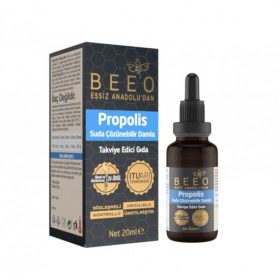
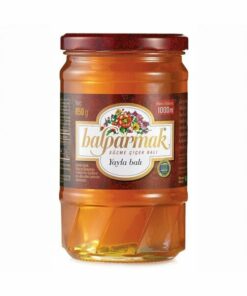

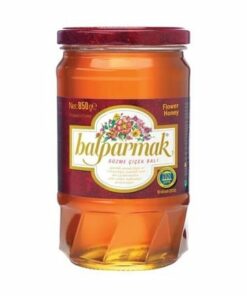
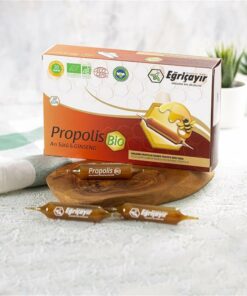
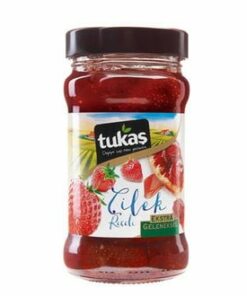
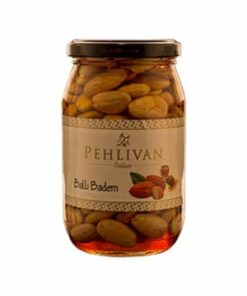
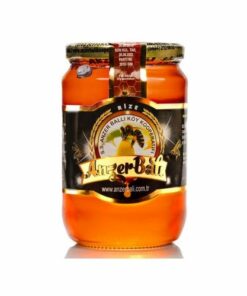
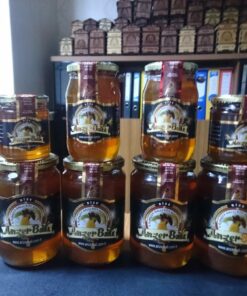
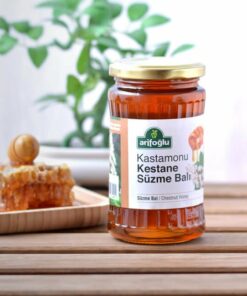
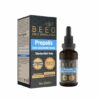

Reviews
There are no reviews yet